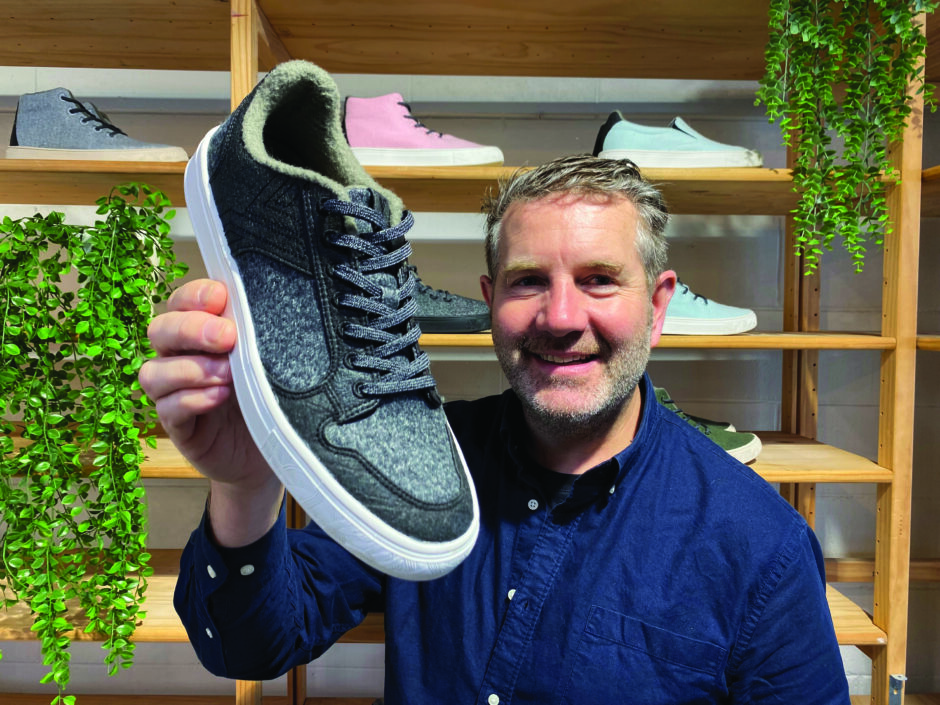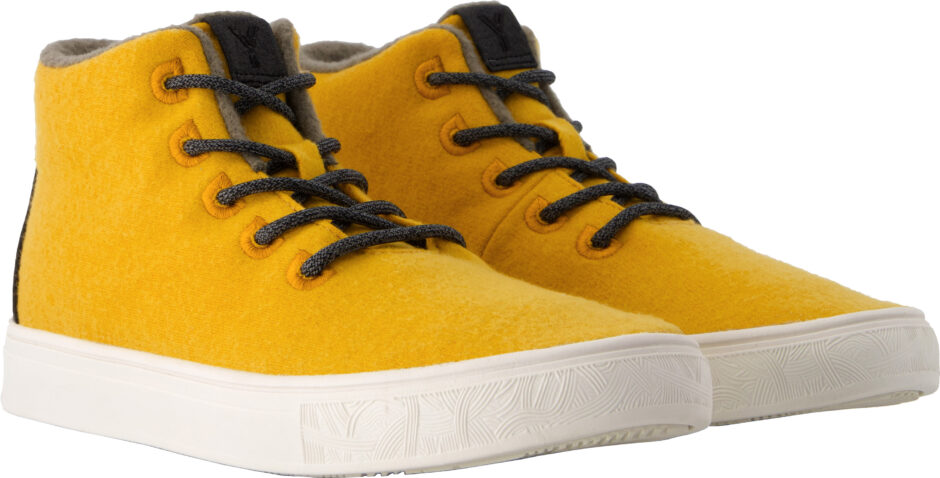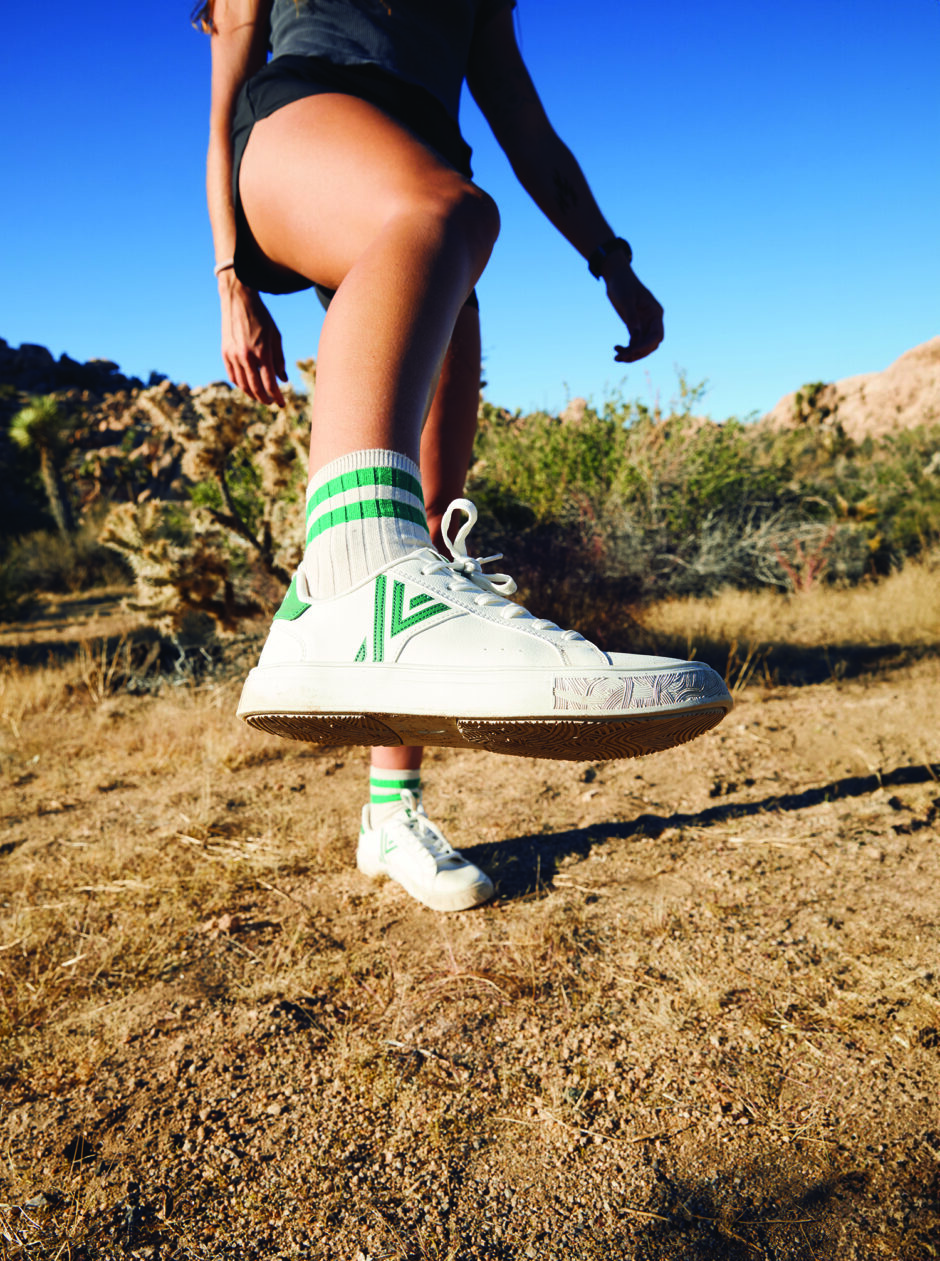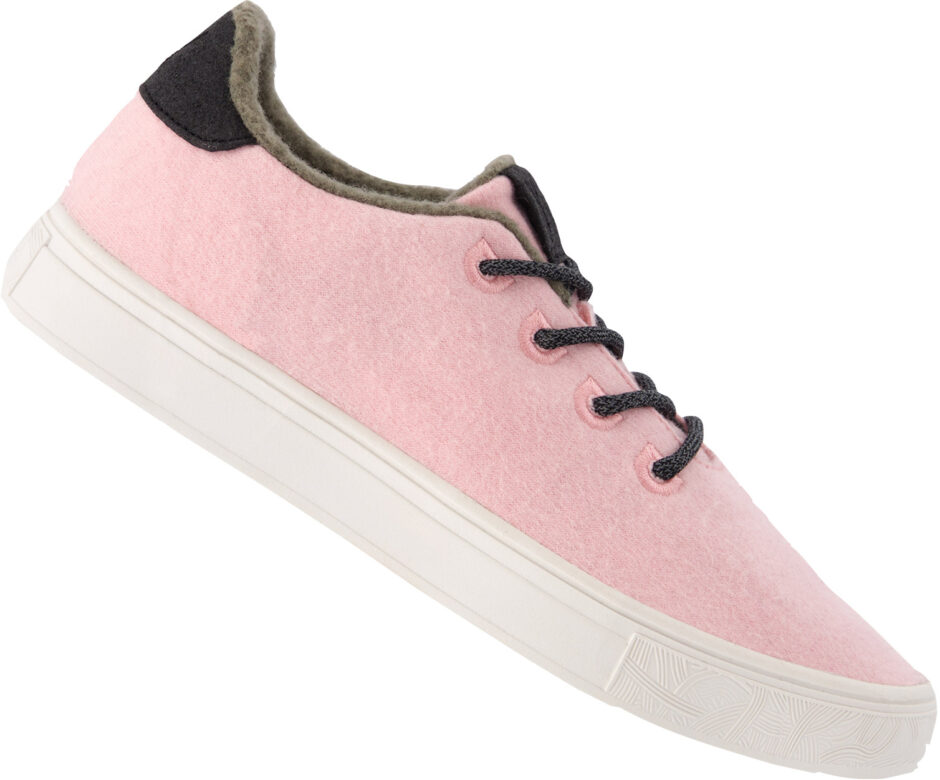
Jeremy bank, founder and president of YY Nation, grew up in the windiest city in the world—Wellington, New Zealand. Not surprisingly, perhaps, Bank took up windsurfing at age 14 and fell in love with the sport. While working part-time in local shoe stores during high school and college, he saved enough money to make annual trips with friends to Hawaii to windsurf Maui’s pristine beaches. Fast forward 20 years and Bank returned with his family for a holiday and was shocked to see the amount of plastic waste washed up on those beloved beaches.
“It wasn’t there 20 years go, and in just that span the impact was dramatic,” Bank recalls. “What would it be like for future generations? I decided then and there to do something about it.” Specifically, Bank asked himself: “Why” is this happening and “why” can’t he do something about it? Hence the name YY Nation, a sustainably made casual sneaker line that he began developing in 2018.
Over the ensuing three years Bank, a shoe and apparel retail and manufacturing veteran of 25-plus years, partnered with pioneers in the materials and technology industries to bring his vision to reality. YY Nation incorporates renewable and biodegradable materials such as merino wool, bamboo, pineapple leather, algae, sugarcane, castor oil, and, the latest, hemp and cactus leather into its designs. The shoes are lightweight, comfortable, durable, and look just like traditionally made sneakers. In fact, the untrained eye would be hard-pressed to see or feel a difference between cactus and genuine leather. It’s just that the former doesn’t include plastics that clog landfills for thousands of years and leach harmful chemicals. “Our goal is to eliminate oil-based plastics in the footwear industry,” Bank says.
 That’s dreaming big, as more than 99 percent of sneakers are currently made from durable and cheap plastics. But, the way Bank sees it, you’ve got to start somewhere. “Eliminating plastic in footwear is a super-big challenge that requires a lot of science and development, and that’s exactly what our team has been focused on,” he explains. “We started from the ground up, literally, looking at crops and raw natural materials that could be developed into components that were suitable for footwear.”
That’s dreaming big, as more than 99 percent of sneakers are currently made from durable and cheap plastics. But, the way Bank sees it, you’ve got to start somewhere. “Eliminating plastic in footwear is a super-big challenge that requires a lot of science and development, and that’s exactly what our team has been focused on,” he explains. “We started from the ground up, literally, looking at crops and raw natural materials that could be developed into components that were suitable for footwear.”
Bank says it’s been a fascinating endeavor, as the natural properties of the materials prove to be better on many levels compared to man-made ones. Merino wool, for example, is soft durable, and features temperature-regulating and moisture-wicking properties. The free-range sheep come down from New Zealand’s southland high country for their annual shearing. It’s all ethically sourced and traceable. Bamboo is lightweight, breathable, and renewable. Pineapple leather, made from discarded leaves that would otherwise be burned by farmers and contribute to greenhouse gas emissions, is durable. It also provides a new revenue stream for farmers. Last but not all, the natural-colored algae outsoles, combined with recycled rubber, are lightweight and flexible. The otherwise harmful algae blooms are harvested from lakes and other waterways. Bank notes that there are more natural materials in the pipeline, as it’s a rapidly evolving field. “We’ve had a phenomenal reaction to our Hemp and Cactus lines with new styles coming in 2024,” he reports. “And we’re working hard on new natural materials for 2025. We call it, ‘Wonder made Wearable.’”
YY Nation’s efforts to change the world have not been without its share of challenges. This is no small undertaking, after all. Plus, launching in the middle of a pandemic introduced unforeseen hurdles. Like the factory the company heavily invested into went out of business. Costs across the board also rose, many components became in short supply, and delays ensued—all very costly for a startup. If that wasn’t tough enough, the pineapple plantation YY Nation partners with experienced a volcanic eruption, destroying the crops. “It’s been hard at times, but we’ve preserved with our vision, and it’s been incredibly rewarding,” Bank says.

To be fair, there are many brands embracing sustainable design to varying degrees, but also with varying degrees of authenticity. There is a lot of noise and suspicion in the space. That’s why Bank believes transparency and honesty is the best policy. It’s why he also welcomes imitators—when it comes to the use of proven sustainable materials. It helps chip away at that 99 percent-plus plastics usage. Even so, Bank believes YY Nation is quite unique, which stems largely from his extensive retail background. He’s not some eco-friendly interloper coming to the industry with a concept, but no clue on how to actually sell and manage a brand. “I appreciate the pressures and needs that retailers have. I understand the flexibility of good suppliers and how they should partner and support retailers,” he says. “Retailers must receive products on time, have good sell-through and reliable margins, have an ability to adjust for good returns, and know they have our full support from us to merchandise, market, and adapt.” Bank adds, “It’s not what we sell-in that matters, it’s the sell-through that counts.” He uses the analogy of New Zealand’s legendary All Blacks rugby team, which have been world champions many times over. “They do the basics very well, and that’s what we do at YY Nation.”
Bank isn’t just blowing shoe industry smoke. Previous roles included retail management (he and his wife owned the Shoe Connection chain prior to launching YY Nation), design and development of new retail concepts, marketing, line building, and manufacturing. “You could say shoes are in my blood, as my grandfather started a business in 1938, and I sold my first shoes on the shop floor at age 12,” he says, noting that his son, who recently joined YY Nation, marks the fourth generation to enter the industry. It helps, he adds, to be surrounded by an “incredible” team of talented and passionate scientists, designers, retailers, administrators, financiers, and advisors. “Footwear retailing and manufacturing is in our blood; our focus and experience in the industry is what separates us from many startup brands,” Bank says. “We’ve developed a high reputation for quality and performance. When people try our product, it’s like an aha moment!”
 Those ahas are translating into strong sales, according to Bank. And that’s in the face of a tough retail headwinds in 2023, thanks to high inflation and general consumer uncertainty caused in part by wars in Ukraine and the Middle East. “Fortunately, YY Nation is fresh and new, and despite the challenges we’ve experienced significant growth,” he reports, adding that the brand’s 18 percent rate on customers returning after three months to buy another pair is noteworthy. “They’re also telling their friends. This reinforces that we’re on track, as word-of-mouth has always been the best form of advertising.”
Those ahas are translating into strong sales, according to Bank. And that’s in the face of a tough retail headwinds in 2023, thanks to high inflation and general consumer uncertainty caused in part by wars in Ukraine and the Middle East. “Fortunately, YY Nation is fresh and new, and despite the challenges we’ve experienced significant growth,” he reports, adding that the brand’s 18 percent rate on customers returning after three months to buy another pair is noteworthy. “They’re also telling their friends. This reinforces that we’re on track, as word-of-mouth has always been the best form of advertising.”
YY Nation customers are primarily what Bank calls “ZMs,” which span late Gen Z to early Millennials. “Our customers enjoy travel and adventure, experiencing life,” he says. “Style comes first, followed by function and comfort. The fact our shoes (SRP: $88 up to $148) are some of the most natural on the planet is a bonus.” The brand’s broad appeal has Bank targeting a range of channels, including comfort and outdoor specialty, family, surf, and boutiques. “We love working with quality retailers who can tell the YY Nation story and provide great service,” he says.
Looking to 2024 and beyond, Bank says the goals for YY Nation are to (always) get greener and continue to grow. “We know we can do better; we’re working towards 100-percent circularity and making further progress in biodegradable technologies,” he says, adding that the company is projecting annual sales growth this year of four times over 2023. “We’re working to become a negative carbon company that makes the most sustainable shoes in the world—ones that people love and other brands aspire to manufacture like us. Ultimately, we want to preserve nature’s playgrounds for future generations to enjoy.” •



